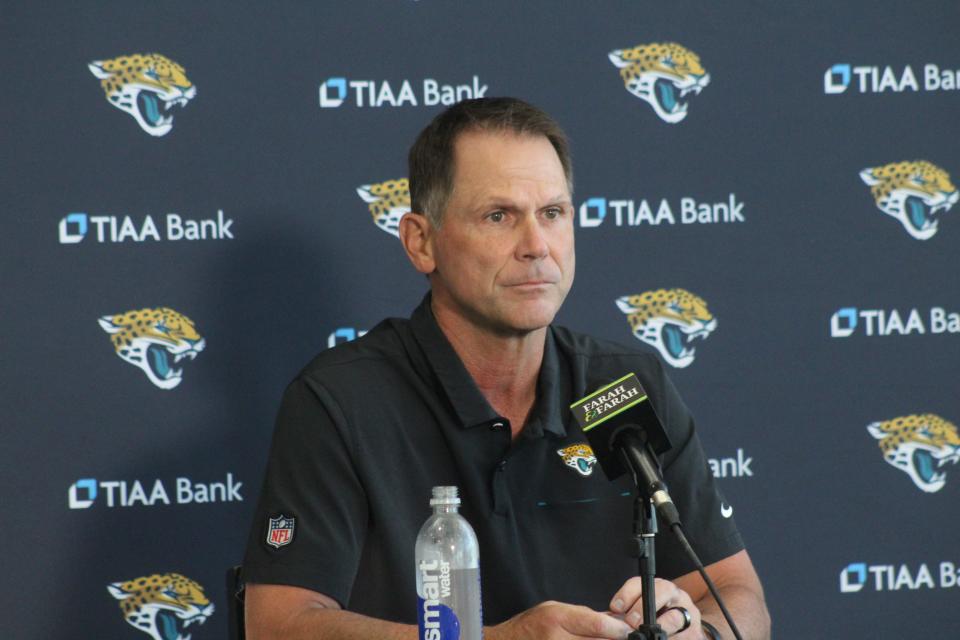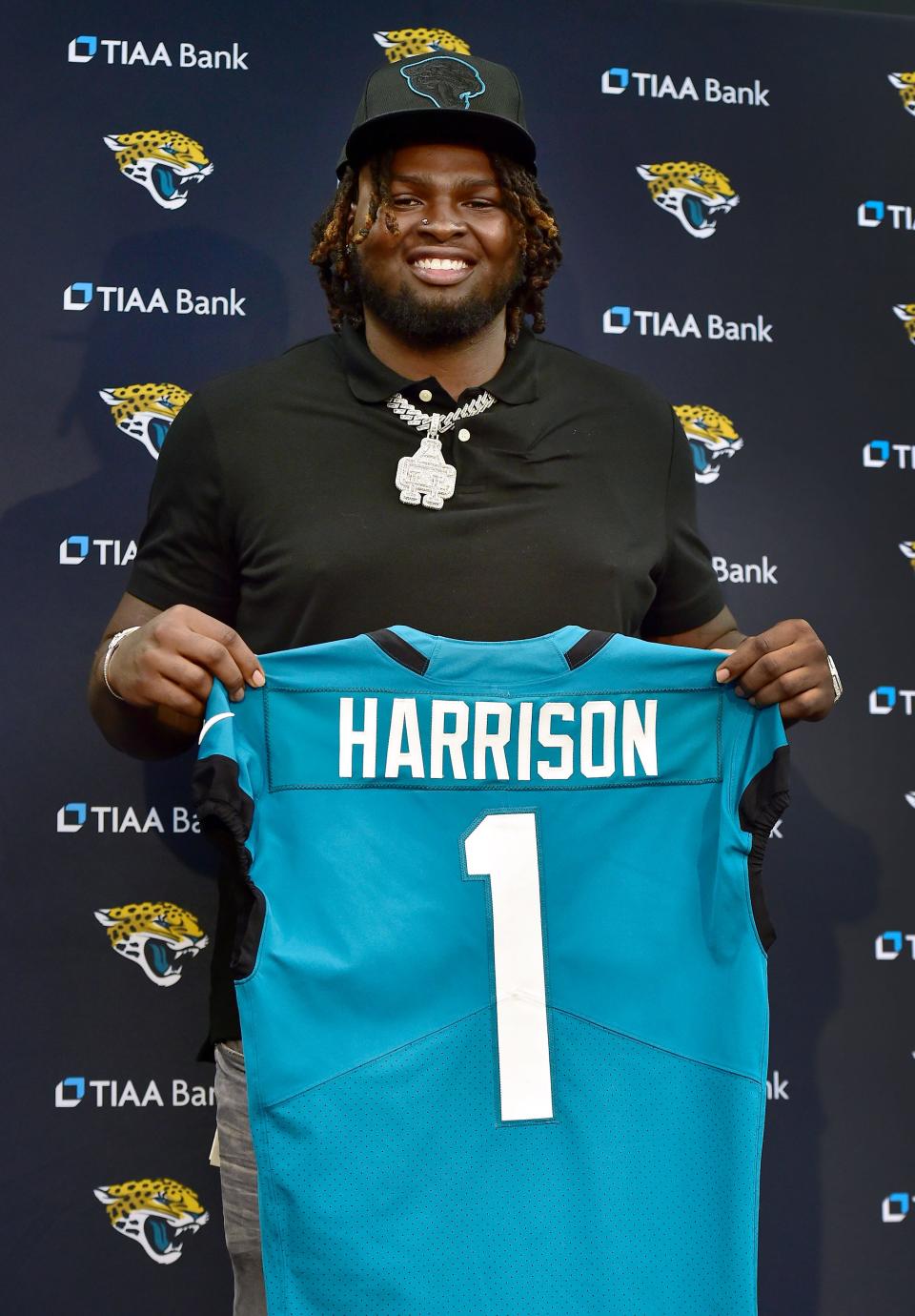Gene Frenette: Trading down strategy by Jaguars' GM Trent Baalke could be big depth payoff
Over the 10 NFL Drafts Trent Baalke has presided over between the Jaguars and San Francisco 49ers, it has never been his foreordained strategy to be a wheeler-dealer.
While draft-day trades are inevitable for almost every NFL team, Baalke isn’t setting out to be Trader Trent.
“I don’t go into a draft thinking I’m going to make these trades, it just happens,” Baalke said in an interview with the Times-Union. “It’s not a calculated get-on-the-phone strategy.
“For the most part, it’s a gut feel of how the board is falling and whether it makes sense to trade back and get a couple picks.”
Under-handed: USGA changeup keeping Talor Gooch out of U.S. Open was a bit underhanded
Risky business: Jaguars' 2020 draft class came back to bite me, lots of other draft analysts
Head start: Good luck to AFC South rookie QBs trying to outduel Jaguars' Trevor Lawrence

Looking at his 49ers’ scoreboard, Baalke took a few more losses than wins on 20 draft-day trades over seven years of being the final authority.
Most notably, he traded up nine spots in 2016 with the Kansas City Chiefs to get into the first round, taking guard Joshua Garnett with the 28th overall pick. When it was KC’s turn at 37, the Chiefs hit the jackpot, landing four-time Pro Bowl defensive tackle Chris Jones.
Baalke also swapped third-round picks with the Indianapolis Colts in 2012, trading down five spots that allowed Indy to grab perennial Pro Bowl receiver T.Y. Hilton, while the 49ers settled for decent nose tackle Quinton Dial.
It often takes years to figure out which team gets the better end of draft-day deals. Trades up or down are crapshoots. Every GM wins some, loses some.
Baalke can claim victory trading down from No. 56 to 63 with the Denver Broncos in 2014, landing running back Carlos Hyde after trading back up to 57th, while the Broncos whiffed on receiver Cody Latimer at 56. Three years earlier, Baalke struck gold trading up nine slots to No. 36 for a quarterback, Colin Kaepernick, who took San Francisco to the Super Bowl and an NFC Championship game.
But when you look at what the 59-year-old executive did last week for the Jaguars — dealing down three times in the first or second round to acquire four extra picks, and still getting the player he wanted — this draft from a trading standpoint has the potential to be a Baalke bonanza.
Acquiring draft capital
When the Jaguars celebrate their golden anniversary as a franchise in a little over two decades, it could be the 2021 draft that delivered quarterback Trevor Lawrence and running back Travis Etienne will be considered their greatest first round, albeit the duos of Tony Boselli-James Stewart (1995) and Fred Taylor-Donovan Darius (1998) are the most impactful for now.
But what Baalke did in this year’s first round, though offensive tackle Anton Harrison was the only player drafted at 27, has a chance to be plenty significant.
“You could argue it was our best round because we got four players for one [pick],” said Baalke.

That’s because the Jaguars’ GM traded down twice — from 24 to 25 with the New York Giants, then 25 to 27 with the Buffalo Bills — in round one and luckily didn’t lose Harrison to the Dallas Cowboys or have somebody trading up to 26 to grab him.
When Giants GM Joe Schoen called about moving up one spot, Baalke naturally asked him who he was taking by saying: “Offense or defense?”
When Schoen said defense (the Giants took cornerback Deonte Banks), Baalke immediately agreed to the trade that netted the Jaguars safety Antonio Johnson (5th round) and fullback Derek Parish (7th round).
It was an easy, no-stress deal, which was far different from the Jaguars’ next two trade-down scenarios.
“Now there’s a point where you can get too cute and it could have backfired,” Baalke said.
Waiting to exhale
Right after trading down with the Giants, another inquiry from Buffalo Bills GM Brandon Beane about moving from 27 to 25 led to a comical exchange with Baalke, who was nervous about pulling this trigger out of fear he could lose Harrison.
Beane told the Green Light podcast with Chris Long that there were some nerve-racking moments during two phone conversations with Baalke.
Without mentioning any names, the Jaguars’ GM wanted assurances from Beane that the Bills didn’t intend to take Harrison, but it made for some humorous dialogue.
“[Baalke] is like, ‘You’re going to have to tell me who [Buffalo] is taking,’ “ said Beane. “I was like, ‘Well, Trent, I don’t necessarily want to tell you who I’m taking.’ He’s like, ‘Well, we’re going to have to figure this out some way or the other because if I don’t know that you’re not taking my guy, I’m not moving back.’
“So then he goes, ‘offense or defense?’ I said offense. Then he goes, ‘All right, I need more.’ Then he goes, ‘big or small?’ I said medium. He goes, ‘Are you taking a tight end? I said yeah. He goes, ‘all right, let me call you right back.’
“Well, it’s like the longest two minutes and he still hasn’t called back. Now I’m hearing Jacksonville is on the [draft] clock. So I called him back and I’m like, ‘Trent, I’m telling you, we’re not taking the same guy. I think I know where you’re headed. We’re not taking the same guy and you’re going to get [the Jaguars’ target].’
“He was nervous about it. I’m glad he got his guy [Harrison] with the 1.”
Baalke verified Beane’s version of the story, but he didn’t feel at ease just because the Bills took Utah tight end Dalton Kincaid with the 25th pick.
He had to sweat out the Cowboys not taking Harrison at 26, or trading the pick to a team that might steal away Baalke’s top choice.
Luckily, the Jaguars guessed right. Dallas kept the pick and selected Michigan defensive tackle Mazi Smith. Baalke could exhale.
Another opportunity to move down again from 27 was there. Baalke decided since he already got three picks at no cost to the Jaguars, it was best to avoid more risk and simply draft Harrison.
Taking bigger gamble
Every team makes projections about how they think a draft is going to proceed through each round, but there are always surprises along the way that can impact strategy.
Baalke is a big believer in sticking to his team’s value board. Still, trading down multiple spots means taking educated guesses about what other teams might do as the Jaguars wait their turn to go back on the clock.
That was the case in the second round, where Baalke dealt the 56th overall pick to the Chicago Bears for their No. 61 and a fifth-rounder (No. 136). Once that trade was done, the Jaguars’ GM hoped one of two players — Penn State tight end Brenton Strange and another he declined to divulge — would still be available.
Unlike the first round, this was much riskier because Baalke had to wait on five picks, increasing the odds of the Jaguars losing a player he envisioned starting in two-tight-end sets this year and should be TE1 at some point.
The Jaguars had a big need at cornerback, and two of them — Miami’s Tyrique Stevenson and Michigan’s D.J. Turner II — went off the board at 56 and 60. Another Big Ten tight end projected to go around the same time as Strange, Michigan’s Luke Schoonmaker, went to the Cowboys at 58.
It worked out that one of the players Baalke wanted, Strange, remained on the board and the Jaguars grabbed him.
“We didn’t make one trade back this year and not get the player we would have taken where we were [originally] sitting,” said Baalke. “We were going to take Brenton Strange [at 56]. I looked at the odds of keeping him [by trading down]. We felt good about two players. Your first player could be gone and you’ll have to live with the next guy.
“If both of them hadn’t been there, we would have tried to trade back again.”
Instead, the Jaguars not only got Strange, but Louisville’s Yasir Abdullah in the fifth round (No. 136), fortifying a pass rush behind Josh Allen and Travon Walker that is in dire need of reinforcements.
'You can screw it up'
Baalke understands as well as anyone how much luck can make the difference between a good draft and one he’d rather forget.
Aside from the trades that allowed Kansas City to still get Jones and Indianapolis to acquire Hilton, the most bothersome one came in 2013 when he traded down from No. 34 to No. 40 with the Tennessee Titans.
Baalke wanted cornerback Darius Slay, who was projected as a second-round or third-round pick. Four cornerbacks were taken in the first round, so Baalke felt he could still land Slay with the eighth pick of round two, then make good use of a 2014 third-rounder he received aside from the Titans’ 40th pick.
The trade backfired. The Detroit Lions used the 36th pick to draft Slay, who went on to make multiple Pro Bowls with Detroit and the Philadelphia Eagles. Baalke wound up drafting Florida State pass-rusher Tank Carradine, who was coming off an ACL injury, started only eight games in four seasons in San Francisco and collected just 5.5 sacks.
Linebacker Chris Borland, the extra pick Baalke got in 2014 from trading down, played just eight games with the 49ers and retired the following spring, citing concerns about head trauma.
“I ended up with Tank Carradine and he was injured, it didn’t work out,” said Baalke. “You can screw it up by wheeling and dealing and thinking you’re smarter than everyone else.”
In this year’s draft, Baalke didn’t screw it up. The Jaguars acquired four players — Lacy, Abdullah, Johnson and Parish — at least three who have a good chance to make the 53-man roster and make a significant impact. And those are freebie draft picks that didn’t cost the Jaguars anything except a few anxious draft-day moments.
That’s not the whole haul from Baalke’s maneuvering. Among the team’s franchise-record 13 picks, he also got linebacker Ventrell Miller (4th round), receiver Parker Washington (6th round), defensive back Erick Hallett (6th round) and guard Cooper Hodges (6th round) from past trades of picks or a return for discarded veterans Laviska Shenault, Josiah Scott and James Robinson.
Baalke doesn’t dismiss those late Day 3 picks, saying 7th-rounder Raymond Vohasek “is going to have a helluva chance to make the eighth spot as a defensive lineman. I pride myself on being able to find that group of guys.”
Just as coaches going for it on fourth down is risky business, so is the inexact science of drafting and trading picks. Baalke, who has made 14 trades down and 13 trades up in his GM career, took some gambles by trading down three times in the 2023 draft.
Time will reveal the truth, but this time, Trader Trent pulled off what could eventually pay big dividends for the Jaguars.
Gfrenette@jacksonville.com: (904) 359-4540
This article originally appeared on Florida Times-Union: Trader Trent takes risks, goes down in NFL draft to bolster Jaguars' roster

